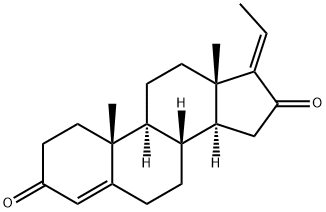Bile acids are essential for solubilization and transport of dietary lipids, are the major products of cholesterol catabolism, and are physiological ligands for farnesoid X receptor (FXR), a nuclear receptor that regulates genes involved in lipid metabolism. They are also inherently cytotoxic, as physiological imbalance contributes to increased oxidative stress. Bile acid-controlled signaling pathways are promising novel targets to treat such metabolic diseases as obesity, type II diabetes, hyperlipidemia, and atherosclerosis. Guggulsterone, derived from resin of the guggul tree, is a competitive antagonist of FXR both in vitro and in vivo. The cis stereoisomer of guggulsterone, (E)-guggulsterone, decreases chenodeoxycholic acid (CDCA)-induced FXR activation with an IC50 value of 15 M. By inhibiting CDCA-induced transactivation of FXR, guggulsterone lowers low-density lipoprotein cholesterol and triglyceride levels in rodents fed a high cholesterol diet.

